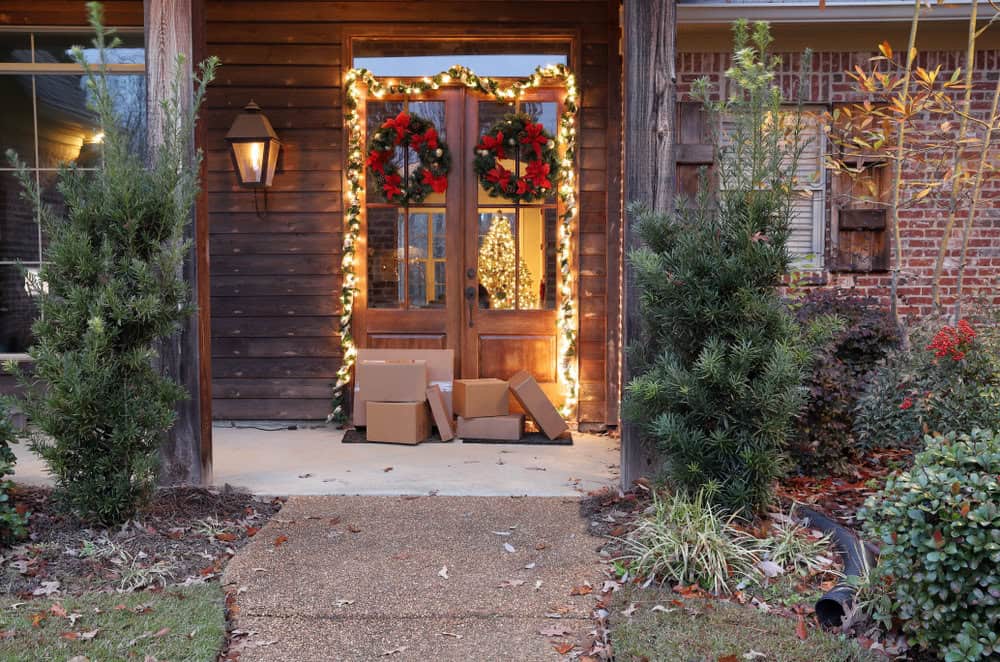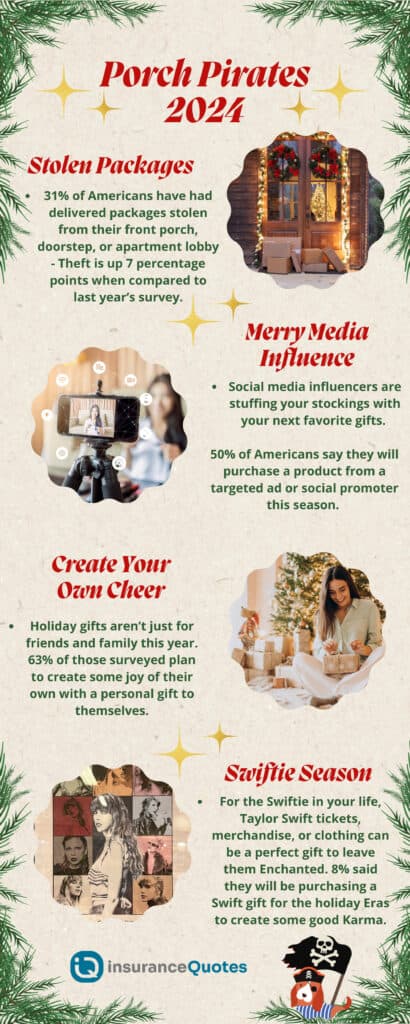Porch Pirates 2024: Arghh You Ready for the Holidays?
By Michael Giusti
Point of view: you receive a text or e-mail notification while you’re at work that your spouse’s Christmas present is being delivered, and it’s just two stops away. A few minutes later, proof of delivery comes in — a photo of your package on your welcome mat.
Success!

But when you pull into your driveway, there are no packages to be found.
Porch Pirates have struck again!
Package theft is a problem every year, and every year InsuranceQuotes.com partners with SSRS Opinion Research to discover just how bad of a problem it has become. According to the 2024 Porch Pirates survey 31% of respondents say they have had a delivered package stolen from their porch, doorstep or building lobby. The 2024 number is a bit of a jump from last year’s and 2022’s stats, which were 24% and 26% respectively.
“Package theft is an issue every holiday season,” said Alexandra Alvarado, director of marketing and education for the American Apartment Owners Association.
Respondents aged 18- to 29-years-old (Gen Z and Millennials) reported a higher rate of Porch Piracy, with 48% saying they have had a package stolen. Older adults, those 65+, report being victims of Porch Pirates less often, with only 15% saying it has happened to them.
Younger respondents also reported higher levels of anxiety surrounding package theft. Among the younger age group, 73% said that thinking about the possibility of their packages being stolen gives them anxiety. That’s compared with 55% of respondents overall and just 38% of the older respondents.
The age discrepancies could be chalked up to older respondents perhaps ordering fewer things online than their younger counterparts. But it is also equally probable that older respondents could be more likely to be able to be at home when their packages are delivered.
Package theft was a problem nationwide, but notably, residents in the Midwest reported the lowest levels of package theft, with only 22% of respondents saying ‘yes’ from that region this year, and in 2023 it was 17%.
Alvarado said there are so many variables and risk factors in play, and even within a specific region or city, some neighborhoods can be less prone to package theft than others.
“I have friends who live in apartments in downtown LA, and they have some packages delivered to my house or their mom’s house,” Alvarado said. “I don’t get porch pirates in the same way. I went on vacation and had three packages delivered, and I didn’t have any problems. That’s not the case in every neighborhood.”

Holiday Shopping Trends
Retail research shows that the holiday shopping season is getting longer. According to research done by Emarketer, the “Cyber 5” — the five days after Thanksgiving, is expected to account for more than 15% of holiday retail shopping.
With so much online shopping happening at one time, Porch Pirates have more and more opportunities to strike.
One new trend that has emerged in this year’s holiday shopping is the role artificial intelligence is beginning to play in gift giving. While it is by no means widespread, according to our survey, 13% of respondents say that, this year, they’re using ChatGPT or another similar AI tool to assist with their holiday shopping.
Unsurprisingly, Gen Z and millennials are more likely to use an AI tool, with 22% of 18- to 29-year-olds responding yes and 19% of 30- to 49-year-olds responding yes.
Although AI shopping tips are new, looked at another way, the result shows most people are still putting their own thought into their gift giving with only a little more than 1 in 10 people getting help from AI to assist in their shopping.
Another place shoppers are finding gift inspiration is social media. According to our survey, 50% of shoppers say that, this year, for their holiday shopping, they are buying at least one item they saw promoted on social media. That is a spike from the statistic last year, which was 37%.
Younger respondents were much more likely to say they were looking to social media for gift ideas, with 67% of 18- to 29-year-olds saying yes, compared with just 29% of people 65 and older. Age was the primary indicator when it came to getting inspiration from social media, with different income levels, education levels, and regions of the country all reporting about the same tendency.
Self care is another gifting trend that has emerged, with “treating yourself” becoming a common urge, especially among younger respondents. In this year’s survey, 63% or respondents say that, this holiday season, they are buying at least one gift for themselves. This is especially true for 18- to 29-year-olds, with a whopping 79% answering yes to this question.
And whether it is a concert ticket, t-shirt, or bracelet-making kit, 8% of respondents said that this holiday season, they are buying at least one Taylor Swift-related gift. That shows some staying power because last year, 9% of respondents reported the same.
Fighting the Pirates
One common refrain from shippers is that while package theft is a frustrating occurrence, it is far from inevitable.
“The vast majority of our packages make it to our customers without issue,” said Alisa Carroll, spokesperson for Amazon. “There are a number of ways to keep packages safe all year long, including technology to track their packages.”
Keeping packages safe often starts with knowing when they are going to be delivered. Every major shipping service, and many individual retailers offer tracking notifications with either text messages or push notifications alerting the buyer that the package is on the way, even down to the moment it is left on the front porch.
The sooner that package can be brought inside, the less likely it is to be stolen.
Another best practice is to offer the driver delivery instructions, such as if there is a big planter on the porch, the buyer can request the driver hide the package out of view, or if maybe a side door would be more secure than the front door.
If it is possible, arranging to be home when the package is delivered is ideal, if not always possible. If the buyer can’t be home when it is scheduled to be delivered, buyers can request the package be shipped to an alternate location, whether that is a shipper’s storefront location, or in many cases, retail locations such as office supply stores or even pharmacies that volunteer to sign for packages on the buyer’s behalf.
“We have more than 24,000 pickup locations across the country that allow customers to pick up packages when and where it is convenient,” Carroll said.
Amazon and many large apartment complexes offer package lockers that allow the shipper to secure the package until the buyer retrieves it with a code. These lockers are emerging as a best practice in many communities that are prone to package theft.
“What a lot of multifamily owners are leaning to is secure locker systems and package services that are a lot safer,” Alvarado said.
In some communities, Amazon also offers a garage delivery service where the driver can punch in a one-time code to a keypad on specially equipped garages, allowing them to drop the package inside the garage and have the door close behind them securing the package.
“Ring cameras are also a good idea,” Alvarado said. “A camera doesn’t always deter a theft, but it can certainly help. At least they know they can be seen.”
How to Respond
If the worst happens and your package isn’t there when you expected it, experts say a few simple steps will go a long way to make things right.
First, don’t just assume a thief has made off with your package.
In many cases the package was actually just tucked into a clever hiding place by the driver. Check the proof of delivery to see where the package was supposed to be. Other times, you might just notice in the picture that the package was left on your neighbor’s door mat by mistake.
Next, check with family members and neighbors. Sometimes they saw the delivered item sitting on the front step and were actually helping out by grabbing it before a thief could.
Although it is a less convenient option, if the package is especially valuable, requiring a signature so the driver doesn’t just leave it unattended may make sense.
Even still, thefts do happen. And when it does, the best first step is to contact the shipper for proof of delivery, and then contact the merchant to report the item missing.
Filing a police report is important, too. A police report is required if you are going to file an insurance claim, and many merchants require them in order to process a replacement or a refund. Plus, if the police don’t know that package theft is a problem in an area, they can’t do anything to deter it.
Merchants often do offer refunds out of good faith, as long as those thefts don’t happen too often or become a pattern.
If the merchant doesn’t refund the item, it might be covered by insurance. In the case of high-dollar items, homeowners insurance would kick in to cover the theft – after the deductible, of course. That deductible may eat up most of the benefit of filing a claim, though.
If the purchase was made with a premium credit card, many card issuers offer purchase protection that would refund a stolen item within a set number of days from the purchase date. Again, a police report is essential to file this kind of claim.
Who is Responsible
Unfortunately, the ultimate responsibility when it comes to package theft falls on the recipient. Once the shipper safely delivers the package into the mailbox or onto the buyer’s property, custody has transferred, and the merchant and shipper are both officially off the hook. Still, many merchants will offer a refund or replacement just to maintain good will.
Regardless of whether you get a refund or a replacement, a few things are certain — package theft is a crime, and it is frustrating.
In this year’s survey, 34% of respondents say they want the next U.S. president to address the issue of package theft.
As of right now, excluding the U.S. mail, package theft is handled on the local level by the police or sheriff’s office in each community. The U.S. mail is protected by the federal Postal Inspection Service.
Some states have moved to increase penalties on package theft. And there is even a federal effort afoot to increase penalties. The Porch Pirates Act introduced in 2024 by Minnesota Rep. Dean Phillips would treat package theft the same as mail theft. Lawmakers haven’t yet advanced that bill for a vote.
Even if the Porch Pirates aren’t prosecuted, Alvarado said it is oddly satisfying to watch the clever lengths some entrepreneurial YouTubers have gone to in order to get back at Porch Pirates.
“People want justice, but unfortunately it is not so easy for a regular Joe to do that. You just have to work with what you’ve got,” Alvarado said.
Michael Giusti, MBA, is senior writer and analyst for InsuranceQuotes.com
